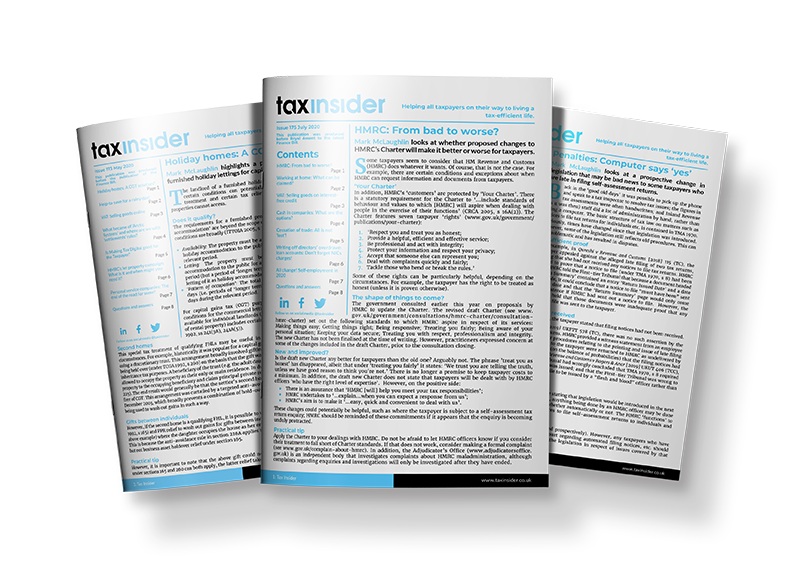 Mark McLaughlin warns of difficulties potentially faced by individuals seeking capital gains tax private residence relief with little or no evidence that the property was occupied as their only or main residence.
Mark McLaughlin warns of difficulties potentially faced by individuals seeking capital gains tax private residence relief with little or no evidence that the property was occupied as their only or main residence.
----------------------
This is a sample article from our tax saving newsletter - Try Tax Insider today.
---------------------
Most individuals who own a house assume (or at least hope) that principal private residence (PPR) relief from capital gains tax will be available when they dispose of the property.
Basic requirements
PPR relief is subject to certain conditions. First and foremost, the dwelling must have been occupied as the individual’s only or main residence at some point during their period of ownership. This requirement might seem straightforward. However, it can sometimes be difficult to convince HM Revenue and Customs (HMRC) that the property was occupied as the individual’s only or main residence.
It is not enough for someone merely to assert that the ‘occupied’ and ‘residence’ elements were present. Some individuals probably fail to obtain PPR relief because they were ‘trying it on’ with HMRC. However, several tax cases have shown that others failed due to insufficient evidence to demonstrate occupation as an only or main residence.
For example, in Patwary v Revenue and Customs [2024] UKFTT 53 (TC), the taxpayer had previously lived at home with his parents. In April 2010, he bought a house (EC). The taxpayer stated that he lived at EC from April 2010 to October 2013 together with his partner and a tenant who shared the whole property with them. From October 2013, EC was occupied by a tenant, the taxpayer having moved back to live with his parents. EC was sold in February 2016 at a gain. The taxpayer appealed when HMRC refused his PPR relief claim.
Remarkably little evidence
HMRC contended that the taxpayer did not live at the property as his only or main residence; in addition, if he had lived there, this lacked any degree of permanence or continuity. After living with his parents, the taxpayer did not change his address with his bank, or the electoral roll. He did not provide any documentation that might be expected in relation to residence in, rather than ownership of, the property (e.g., council tax bills). HMRC also pointed out that in a letter to them, the taxpayer said: “The length of my residence at [EC] was unexpected and unforeseen, as a result it made little sense for me to change bank addresses and to register to vote at this address”. HMRC argued this showed that any residence at EC was intended to be temporary.
The First-tier Tribunal (FTT) pointed out that the taxpayer had provided “remarkably little evidence” to demonstrate a period of residence at the property of over three years. The FTT had been presented with nothing but assertions by the taxpayer to back up his claim to have lived at EC. Accordingly, the FTT concluded that the taxpayer had failed to prove that HMRC’s conclusion was incorrect. The taxpayer’s PPR relief claim was rejected.
Practical tip
HMRC’s Capital Gains Manual (at CG64545) lists various types of evidence that may be useful in establishing where a taxpayer resides (albeit in a different context). In Patwary, whilst accepting that over time some documents may be difficult to obtain, it seemed unlikely to the FTT that no documentation would remain or could be obtained had the taxpayer tried. In addition, there was no supporting non-official documentary evidence (e.g., statements from his lodger or his partner).



